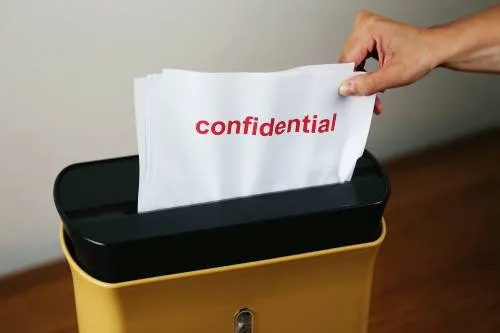Shred Your Secrets: Secure Disposal of Confidential Waste
The Importance of Secure Disposal of Confidential Waste
In a world filled with digital footprints, the consequences of improper waste disposal can be a nightmare. Imagine your personal information falling into the wrong hands, leading to identity theft, data breaches, and potentially devastating legal repercussions. From social security numbers to financial records and medical data, the types of information considered confidential are vast and diverse. Understanding relevant data privacy laws is crucial, with potential fines looming for those who neglect proper disposal practices.
Identifying Confidential Waste
To safeguard against data breaches, it’s vital to recognize common confidential waste items such as documents, CDs, hard drives, and electronics. Whether dealing with physical documents or digital files, understanding how to identify confidential information is key to maintaining security.
Safe Disposal Methods
Shredding: When it comes to paper documents, not all shredders are created equal. Explore the differences between cross-cut and strip-cut shredders and understand the security levels they offer. Delve into the pros and cons of on-site shredding versus off-site shredding services to make an informed decision tailored to your needs.
Data Wiping
For electronic devices, learn how data wiping ensures the permanent removal of sensitive information. Discover various data wiping software options to find the one that suits your requirements.
Other Secure Disposal Methods: Briefly explore the world of secure incineration, particularly suitable for highly sensitive materials that demand the utmost privacy.
Choosing the Right Disposal Method
Guide readers on selecting the appropriate disposal method based on the type of waste and desired security level. Consider factors such as volume, frequency of disposal, and budget constraints to make an effective choice that aligns with your needs.
Additional Tips & Resources
Beyond the basics, offer practical tips for enhanced security, such as shredding before recycling and utilizing secure collection bins. Provide valuable resources, including links to regulatory websites and reputable shredding service providers, empowering readers to take proactive steps towards secure waste disposal.

Secure Disposal of Confidential Waste By UK Government
The UK Government prioritizes the secure disposal of confidential waste to safeguard sensitive information. Committed to upholding data privacy and complying with stringent regulations, the government employs robust disposal practices. Document shredding, electronic data wiping, and secure incineration are among the methods utilized. These measures ensure the protection of citizens’ personal data, mitigating the risk of identity theft and unauthorized access. By adhering to established protocols and regulations, the UK Government demonstrates its dedication to maintaining the highest standards of confidentiality and security in the disposal of confidential waste.
How to destroy documents without a shredder?
When lacking a shredder, alternative methods can effectively destroy sensitive documents and protect your privacy. One straightforward approach is tearing the documents into smaller pieces by hand. This manual method may be time-consuming, but it ensures that information is rendered illegible and challenging to reconstruct. Another option is to soak the documents in water, turning them into a pulpy mass. This not only makes it difficult to read the content but also prevents any potential reconstruction.
For those seeking a more creative solution, consider repurposing old documents by turning them into papier-mâché. This eco-friendly option not only disposes of the information securely but also contributes to recycling efforts. Additionally, burning documents in a controlled and safe environment is a traditional and effective method. However, exercise caution and adhere to local regulations to prevent any hazards.
In the absence of a shredder, these alternatives offer practical and accessible ways to destroy documents, maintaining your confidentiality and mitigating the risk of unauthorized access to sensitive information. Choose the method that aligns with your preferences and environmental considerations for a secure disposal solution.
Domestic Confidential Caste Disposal
Domestic confidential waste disposal is a critical aspect of maintaining privacy and security within households. In today’s information age, households accumulate a plethora of sensitive documents containing personal details, financial information, and other confidential data. Proper disposal is paramount to safeguard against identity theft and unauthorized access.
Common methods for domestic confidential waste disposal include investing in a personal shredder, ensuring documents are shredded thoroughly before disposal. Alternatively, individuals can leverage local community shredding events or utilize professional mobile shredding services that cater to residential needs. These services often bring secure shredding trucks directly to homes, ensuring the confidential waste is destroyed on-site.
In addition to paper documents, electronic devices like old computers, hard drives, and CDs may contain sensitive information. Domestic disposal methods extend to electronic waste, where secure data wiping or physical destruction of the devices becomes crucial.
Ultimately, prioritizing domestic confidential waste disposal is not only about maintaining a clutter-free environment but also about protecting oneself and family members from the potential risks associated with improper handling of sensitive information. By adopting secure disposal practices, households can contribute to a safer, more secure living space.
Are You Looking For Where Can I dispose of car batteries?
Can You Destroy Documents in a Washing Machine?
Attempting to destroy documents in a washing machine is an unconventional and generally ineffective method of disposal. While the intention might be to render the documents unreadable, the process poses several challenges. Paper has a resilient nature, and the agitation and water involved in a washing machine may not guarantee complete destruction.
When subjected to water, documents may become a soggy mass, but individual fibers can still be discernible, and determined individuals might attempt to reconstruct the information. Ink may also spread, creating a messy pulp rather than ensuring thorough obliteration of sensitive content.
Furthermore, washing machines are not designed for paper disposal, and the remnants could lead to plumbing issues or damage the machine itself. The use of detergents or fabric softeners may introduce additional chemicals into the mix, potentially compromising the privacy of the information.
For effective and secure document disposal, traditional methods such as shredding, tearing, or soaking in water followed by thorough drying are more reliable. These methods offer a higher level of assurance that sensitive information is irreversibly destroyed, reducing the risk of unauthorized access.
Conclusion
In a world where information is a valuable currency and the threat of identity theft looms, the secure disposal of confidential waste becomes paramount. While shredders are a popular tool for this purpose, not having one doesn’t leave you defenseless. This blog explored various alternatives for disposing of confidential waste without a shredder, ensuring your sensitive information remains confidential.
From the simplicity of tearing documents by hand to the transformative power of turning them into papier-mâché, there are practical, eco-friendly options available for the disposal of confidential waste. Soaking documents in water and burning them are time-tested methods that guarantee your privacy, even in the absence of a shredding machine.
As you embark on the journey to protect your personal information, consider factors like convenience, security, and environmental impact when choosing a disposal method for confidential waste. Whether tearing, soaking, repurposing, or burning, the key is to make your documents unreadable and irretrievable.
Empower yourself with these alternatives, and remember, the goal is not just destruction but the assurance that your secrets remain safe through proper disposal of confidential waste. Choose the method that aligns with your preferences, and take a step towards a more secure and private existence. In the battle against identity theft, every torn piece and every drop of water becomes a shield, ensuring that your confidential waste is disposed of securely, without compromise, and safeguarding your sensitive information.






